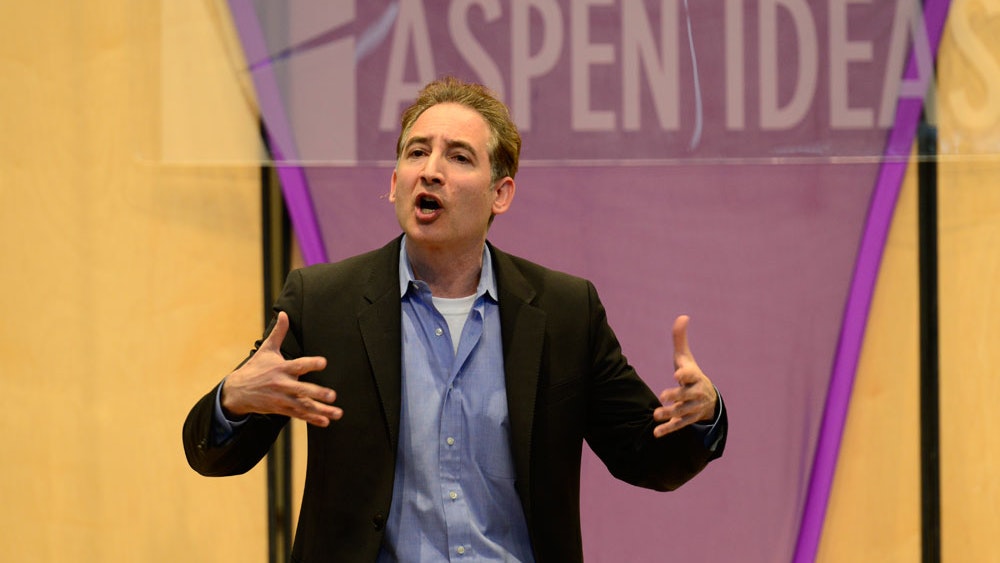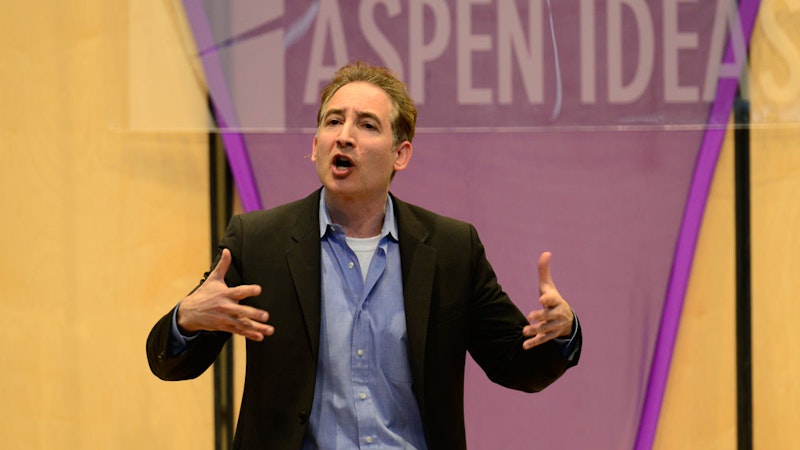
The God Particle
Setup
Physicist Brian Greene explains the Higgs boson particle, also known as the "God Particle," and why you should care about it. This energetic and delightful talk will make you wish your high school physics teacher taught like this. Greene says the feat of finding such a particle is akin to "trying to hear a tiny, delicate whisper over the massive thundering, deafening din of a NASCAR race."
Greene gave this talk in 2012 just days before CERN (the European Organization for Nuclear Research) confirmed the theory of the Higgs boson using the Large Hadron Collider. The following year, the Nobel prize in physics was awarded jointly to François Englert and Peter Higgs “for the theoretical discovery of a mechanism that contributes to our understanding of the origin of mass of subatomic particles.”
- 2012 Festival
- Science
- Full transcript
Space is sticky like molasses
Around 1970, Peter Higgs imagines that all of space is uniformly filled with an invisible substance that’s sort of like molasses. When a particle, like an electron, tries to move through this molasses, the resistance it encounters is what we interpret as the mass of the particle. In fact, the idea is that different particles would have different degrees of stickiness which means they would experience a different amount of resistance as they try to borrow through this pervasive molasses. Higgs’s theory, if proven, would rewrite the very meaning of nothingness because the field, or molasses, is essentially an unremoveable occupant of space.
How are scientists looking for this invisible, molasses-like field?
The Large Hadron Collider at CERN, in Geneva, is about 18 miles around. Protons are sent cycling around the collider in opposite directions, near the speed of light, so fast that they can traverse that 18-mile race track more than 11,000 times each second. And these particles engage in head-on collisions. It’s a monumental challenge to carry out this procedure. “It’s like trying to hear a tiny, delicate whisper over the thundering, deafening din of a NASCAR race,” says Greene.
By the numbers
What’s the point of finding and confirming the Higgs particle?
Fundamental discovery can have a profound impact on the way we live our lives, but we must wait for theoretical discoveries to turn into practical applications. Confirming the existence of the Higgs particle in 2012 substantiated 30 years of theoretical science. In short, the Higgs discovery put the bang in the Big Bang Theory.
Why it matters
Why should we care about something so specific to theoretical physics?
Greene goes on to give his personal reasons for pursuing science and discovery:
Learn More
Additional Information
Explore More
Science

Since 2014, Aspen Ideas: Health has welcomed over 700 inspiring women leaders to our stages to share their bold approaches to better health. In honor of Women's History Month,...


Scientists could actually be close to being able to decode animal communication and figure out what animals are saying to each other. And more astonishingly, we might even fin...

Whether you love setting New Year’s resolutions or ignore them entirely, there’s still a certain mix of nostalgia and excitement over the ending of one year and the possibilit...


A technological future where our brain waves could be monitored and our thoughts decoded and analyzed — sometimes against our will — is not as far away as we think. But our ex...

Setting audacious goals helps to redefine what is achievable in health, medicine, and science. As we deepen understanding of the human genome, unravel the mysteries of the bra...

What does the latest in neuroscience tell us about human health and consciousness? Aspen Ideas Festival speakers explore how biology is being integrated with technology in unp...

At the 2023 Aspen Ideas Festival, we dug into some of the most important and fascinating issues of our time, from rebuilding trust in our institutions and the promise and peri...
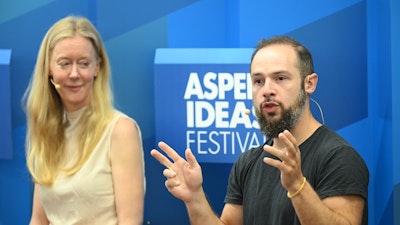
A.I. can find meaningful patterns in otherwise unintelligible noise, so scientists are starting to wonder: Can A.I. help humans interpret animal sounds? Scientist Karen Bakker...

DOORS OPEN AT 6PM. In the film Eternal Sunshine of the Spotless Mind, Kate Winslet’s character erases painful memories of her ex-boyfriend. Could this be possible in real life...

Stories matter, as do the ways we tell them. Hear from the founder of an audiobook empire and a renowned theoretical physicist on the art and power of capturing and conveying...

The Afternoon of Conversation is the Aspen Ideas Festival's pinnacle programming moment. Over 2,000 people gather in the Benedict Music Tent, an open-air venue with acoustics...
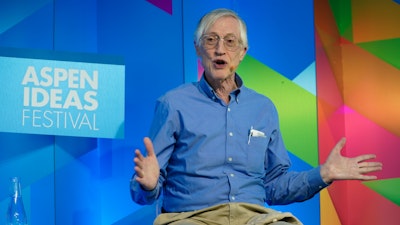
The decline in trust of scientific institutions over the course of the pandemic is manifested in the number of Americans worried about the truth of scientific progress and the...

The mysteries of brain health are hidden deep within the ridges and grooves of the cerebral cortex. Join Mount Sinai Health System neuroscientists in this discussion of new te...

From the first galaxies that grew after the Big Bang, to black holes swallowing their neighbors, to stars and planets being born today in the Cosmic Cliffs, the James Webb Spa...

Featuring three one-on-one conversations, our tenth anniversary closing session is not to be missed! We begin with comedian Iliza Shlesinger, who opens up to bestselling autho...
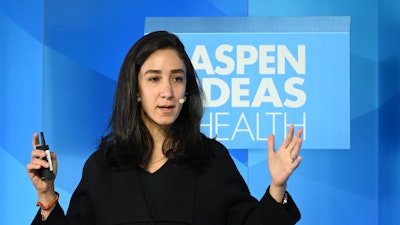
The world has renewed hope that impactful treatments for Alzheimer’s disease and related dementias may finally be on the horizon. While previous therapies have modestly improv...

The belief that the paralyzed will walk and the deaf will hear is a staple of religion, literature, and myth. Now, technology is actually making that happen. Zeen has designed...

Vision, hearing, touch, taste, and smell are the five human senses most of us are fortunate enough to know intimately. We like to say that intuition is our sixth sense, but Em...

When it comes to biomedical research, Earth’s gravity can be an obstacle, making it harder to program stem cells into viable organs, obscuring the crystalline structure of pro...

Research that can generate transformative, high-impact biomedical and health breakthroughs, from the molecular to the societal, is gaining traction as the Advanced Research Pr...


